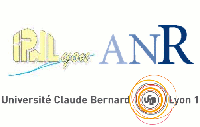Orateur
Dr
Jean-Côme Lanfranchi Lanfranchi
(TU München)
Description
CRESST (Cryogenic Rare Event Search with Superconducting Thermometers) is an experiment aimed at the direct detection of dark matter particles (WIMPs = Weakly Interacting Massive Particles). The CRESST detectors, based on CaWO4 scintillating crystals, are able to discriminate gamma and beta background by simultaneously measuring the light and phonon signal produced by particle interactions. The discrimination of the background is possible because of the different light output (quenching factor) for nuclear and electron recoils.
At the Technische Universitaet Muenchen in Garching an experimental set-up as well as a dedicated detector for high count rates have been installed in Hall 2 of the Maier-Leibnitz-Accelerator-Laboratory. This neutron scattering facility (NSF) will allow to measure the quenching factors of the different nuclei (O, Ca, W) of the detector crystal at mK temperatures.
With a view to next generation experiments like EURECA (European Underground Rare Event Calorimeter Array) the NSF can then also be used for the characterization and calibaration of other target materials like ZnWO4, PbWO4 etc.
Auteur
Dr
Jean-Côme Lanfranchi Lanfranchi
(TU München)
Co-auteurs
M.
Achim Guetlein
(TU München)
Mlle
Chiara Coppi
(TU München)
M.
Christian Ciemniak
(TU München)
M.
Christian Isaila
(TU München)
Prof.
Franz von Feilitzsch
(TU München)
M.
Michael Willers
(TU München)
Mlle
Sabine Roth
(TU München)
M.
Sebastian Pfister
(TU München)
Dr
Walter Potzel
(TU München)
M.
Wolfgang Westphal
(TU München)

